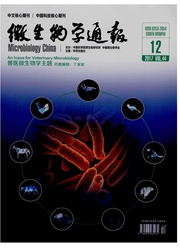

 中文摘要:
中文摘要:
稳定同位素探针技术(Stable isotope probing,siP)是稳定同位素标记技术和各种分子生物学手段相结合的一系列技术总称。将其应用于探查污染物降解的功能微生物,实现了不经过分离培养直接把微生物的代谢功能、微生物间相互作用与微生物种群结合起来,从而克服了传统分离培养的缺陷,扩大了微生物资源的利用空间,具有广阔的发展前景。本文介绍了稳定同位素探针技术的基本原理和技术路线,对常规PLFA—SIP、DNA—SIP、RNA—SIP的特点进行了阐述和对比;综述了SIP在有机污染物——苯系物、多环芳烃、多氯联苯生物降解方面的研究进展,提出SIP应用于根际研究是今后该技术在生物降解研究中的一个发展方向。
 英文摘要:
英文摘要:
Stable isotope probing (SIP) is a series of techniques by combining stable isotope labeling with molecular methods. SIP links microbial function and interactions with identity without isolated culture, which avoids the drawback of pure culture and extends the available boundary of microbial resources. The application of SIP to identify functional microorganisms in organic pollutant biodegradation has a bright prospect. This review introduces the fundamental principal and procedure of SIP, the characteristic of PLFA-SIP, DNA-SIP and RNA-SIP, and the application of SIP in biodegrading organic pollutants (Benzene, Toluene, Ethylbenzene and Xylene (BTEX); Polycyclic aromatic hydrocarbons (PAHs); Polychlorinated biphenyls (PCBs)). Future prospect of SIP in rhizospheric biodegradation is also presented.
 同期刊论文项目
同期刊论文项目
 同项目期刊论文
同项目期刊论文
 Characterization of Cu(II) and Cd(II)resistance mechanisms in Sphingobium sp.PHE-SPH and Ochrobactru
Characterization of Cu(II) and Cd(II)resistance mechanisms in Sphingobium sp.PHE-SPH and Ochrobactru Ectomycorrhizalfungal communities on the endangered Chinese Douglas-fir (Pseudotsuga sinensis)indica
Ectomycorrhizalfungal communities on the endangered Chinese Douglas-fir (Pseudotsuga sinensis)indica Distributions andcompositions of old and emerging flame retardants in the rhizosphere and non-rhizos
Distributions andcompositions of old and emerging flame retardants in the rhizosphere and non-rhizos Effects of EDDS andplant-growth-promoting bacteria on plant uptake of trace metals and PCBs frome-wa
Effects of EDDS andplant-growth-promoting bacteria on plant uptake of trace metals and PCBs frome-wa Influence of rice growth on the fate of polycyclic aromatic hydrocarbons in a subtropical paddy fiel
Influence of rice growth on the fate of polycyclic aromatic hydrocarbons in a subtropical paddy fiel Characterization and risk assessment of polychlorinated biphenyls in soils and rice tissues in a sub
Characterization and risk assessment of polychlorinated biphenyls in soils and rice tissues in a sub Influence of agricultural practice on trace metals in soils and vegetation in the water conservation
Influence of agricultural practice on trace metals in soils and vegetation in the water conservation Simultaneous enhanced removal of Cu, PCBs, and PBDEs by corn from e-waste-contaminated soil using th
Simultaneous enhanced removal of Cu, PCBs, and PBDEs by corn from e-waste-contaminated soil using th Characterization of theexchange of PBDEs in a subtropical paddy field of China: A significant inputs
Characterization of theexchange of PBDEs in a subtropical paddy field of China: A significant inputs Spatial Distribution of Oldand Emerging Flame Retardants in Chinese Forest Soils: Sources, Trends an
Spatial Distribution of Oldand Emerging Flame Retardants in Chinese Forest Soils: Sources, Trends an Anaerobic degradation of Polychlorinated Biphenyls (PCBs) and Polychlorinated Biphenyls Ethers (PBDE
Anaerobic degradation of Polychlorinated Biphenyls (PCBs) and Polychlorinated Biphenyls Ethers (PBDE Influence of the application of chelant EDDS on soil enzymatic activity and microbial community stru
Influence of the application of chelant EDDS on soil enzymatic activity and microbial community stru Effect of cadmium ion on biodegradation of decabromodiphenyl ether (BDE-209) by Pseudomonas aerugino
Effect of cadmium ion on biodegradation of decabromodiphenyl ether (BDE-209) by Pseudomonas aerugino Identification ofBenzo[a]pyrene(BaP)-Metabolizing Bacteria in Forest Soils Using DNA-BasedStable-Iso
Identification ofBenzo[a]pyrene(BaP)-Metabolizing Bacteria in Forest Soils Using DNA-BasedStable-Iso Characteristics, sources, and transport of tetrabromobisphenol A andbisphenol A in soils from a typi
Characteristics, sources, and transport of tetrabromobisphenol A andbisphenol A in soils from a typi Seasonal and diurnalvariations of atmospheric PAHs and OCPs in a suburban paddy field, South China:I
Seasonal and diurnalvariations of atmospheric PAHs and OCPs in a suburban paddy field, South China:I Assessment of the Air?SoilPartitioning of Polycyclic Aromatic Hydrocarbons in a Paddy Field Using aM
Assessment of the Air?SoilPartitioning of Polycyclic Aromatic Hydrocarbons in a Paddy Field Using aM The influence of land use on the concentration and vertical distribution of PBDEs in soils of an e-w
The influence of land use on the concentration and vertical distribution of PBDEs in soils of an e-w Bacteria capable ofdegrading anthracene, phenanthrene, and fluoranthene as revealedby DNA based stab
Bacteria capable ofdegrading anthracene, phenanthrene, and fluoranthene as revealedby DNA based stab Thekey microorganisms for anaerobic degradation of pentachlorophenol in paddy soilas revealed by sta
Thekey microorganisms for anaerobic degradation of pentachlorophenol in paddy soilas revealed by sta 期刊信息
期刊信息
